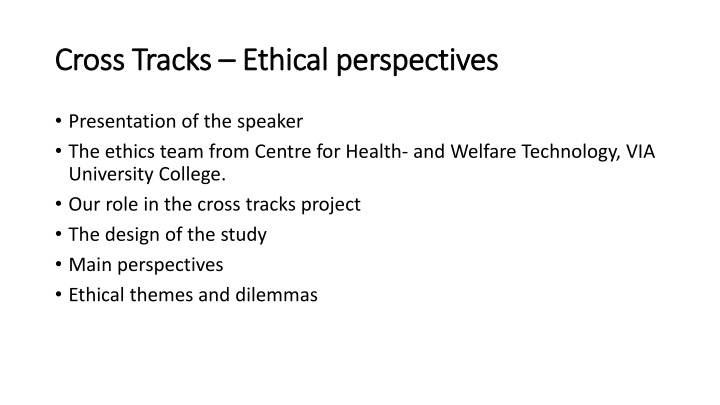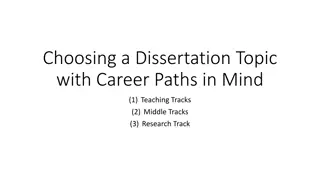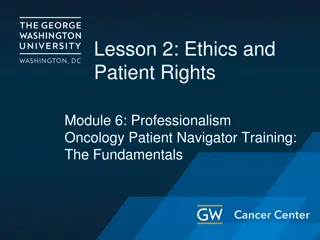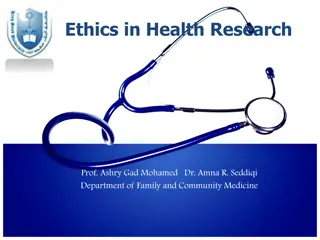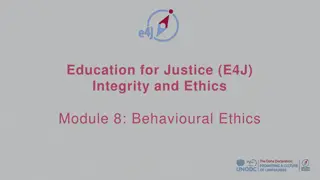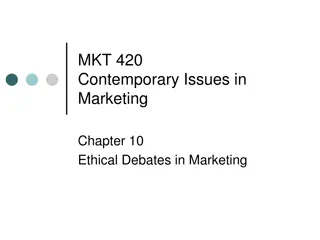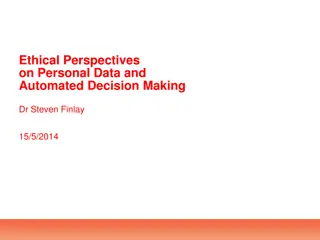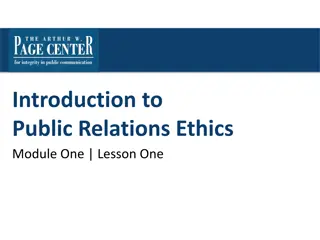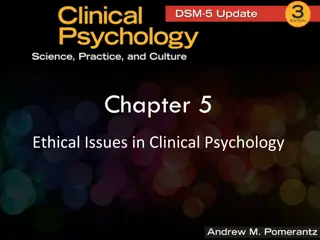Ethical Perspectives and Role of the Ethics Team in the Cross-Tracks Project
The presentation highlights the ethical perspectives and key role of the Ethics Team from the Centre for Health and Welfare Technology at VIA University College in the Cross-Tracks project. Led by Senior Associate Professor Karin Christiansen, the team focuses on ethical themes, dilemmas, and critical inquiry to ensure the development of ethically responsible and sustainable products. Their practice-based philosophical approach aims to inform the design process in time, exploring the relationship between technology and human well-being.
Download Presentation

Please find below an Image/Link to download the presentation.
The content on the website is provided AS IS for your information and personal use only. It may not be sold, licensed, or shared on other websites without obtaining consent from the author.If you encounter any issues during the download, it is possible that the publisher has removed the file from their server.
You are allowed to download the files provided on this website for personal or commercial use, subject to the condition that they are used lawfully. All files are the property of their respective owners.
The content on the website is provided AS IS for your information and personal use only. It may not be sold, licensed, or shared on other websites without obtaining consent from the author.
E N D
Presentation Transcript
Cross Cross Tracks Tracks Ethical Ethical perspectives perspectives Presentation of the speaker The ethics team from Centre for Health- and Welfare Technology, VIA University College. Our role in the cross tracks project The design of the study Main perspectives Ethical themes and dilemmas
Presentation of speaker: Karin Christiansen Presentation of speaker: Karin Christiansen Senior Associate Professor, PhD. Head of Research at Centre for Health- and Welfare Technology and teacher of ethics and philosophy of Science at VIA School of Nursing, Horsens, VIA University College since 2015. PhD in Philosophy, University of Melbourne, Australia (1999-2003). Earlier employment: Associate professor at Centre for Health, Humanity and Culture, Department of Philosophy and History of Ideas, University of Aarhus, Denmark. Focus of research: Ethical implications of emerging biomedical and health- technological interventions. Areas: DNA-diagnostics, genome editing, predictive medicine (genetics, algorithms), social robotics, telemedicine.
Ethics Ethics Team and and Welfare Welfare Technology, VIA University College Technology, VIA University College Team Members Members of Centre for Health of Centre for Health- - Asbj rn Thalund Binderup, PhD, Biomedical Engineer, lecturer at VIA Engineering, Horsens. Lisbet Poulsen, Medical Doctor, lecturer at VIA School of Nursing, Aarhus. Pia Marstrand Jacobsen: Occupational therapist, lecturer at VIA School of Occupational Therapy, Aarhus. Karin Christiansen, Philosopher, Research leader at Centre for Health- and Welfare Technology, Coordinator of ethics team. .
The The role project project role of the of the ethics ethics team in the Cross team in the Cross- -tracks tracks To undertake an independent critical inquiry into the ethical dimensions of the project. Aim: To help facilitate an ethically responsible process and contribute to the development of an ethically sound and sustainable product taking into consideration the perspectives of IT-developers, health professionals, leaders within the health and the public sector, policy makers, educators, NGO s and citizens.
Its It s all in the timing all in the timing Philosophers have often been accused of coming too late (when the technology is already developed) we would like to be there in time to inform the design and future strategy with questions about the relationship between the technology and the good human life . Our philosophical approach: Practice based. Meaning: We do not simply apply ethical principles to the research area (top-down approach). Dialectics between principles and practice.
Design of Design of study study the the first first phase phase Qualitative, semi-structured interviews. Target group: people involved in various parts of the planning and execution of the initial research phase of the project. Number of participants: 7 interviews with IT-developers, people in leadership positions at various hospitals in the Central Denmark Region, doctors. Duration: 1 hour interview. Observation-studies.
Focus Focus areas areas 1. Cross tracks as a research project. 2. Algorithms implemented for predictive purposes in clinical praxis. 3. Future ethical and societal implications.
1. 1. Themes Themes discussed discussed 1. Selection and revision of data. 2. Context-sensitivity and representation 3. Cooperation 4. Transparency 5. Privacy 6. Ownership of data
Algorithms implemented for predictive purposes in clinical praxis
2. 2. Themes Themes discussed discussed 1. Wise and unwise applications of algorithms in the health sector where to draw the line in order to avoid harm and provide adequate care for the patient. 2. Informed consent and respect for autonomy. 3. Trust and confidentiality between doctor and patient. 4. Clinical judgement what role will it play? What kind of validity will it be accorded (compared to the algorithm)? 5. The validity and legitimacy of the patient s subjective experience and preferences (autonomy).
2. 2. Themes Themes discussed discussed 1. What is good to know? What levels of risk should be reported and acted upon by the doctor? How to avoid causing (unnecessary) anxiety and pain. 2. Should we still protect the right not to know ? Or should we develop a proactive system and inform the citizens directly and without their prior consent, when they are in moderate or high risk of developing a disease? 3. Should we contact people, when they are not ordinary users of the health care system (e.g. homeless people)? 4. Responsibility. Who can be held accountable when a prediction and diagnosis proves wrong? 5. Changing professional roles and identities. Are doctors or nurses left redundant?
3. 3. Themes Themes discussed discussed 1. How to secure that the algorithms used as supportive health systems are not limiting individual s agency and freedom? 2. Discrimination. How to prevent that a person does not receive lower quality of care and treatment, if he or she does not accept the use of algoritms? 3. Inclusivity and equality. How to secure that vulnerable citizens are adaequately informed and have access to the new technology? 4. From freedom of choice to social control? How to avoid paternalistic use of data for predictive purposes in a situation where changed demographics demands rationalistic measures?
